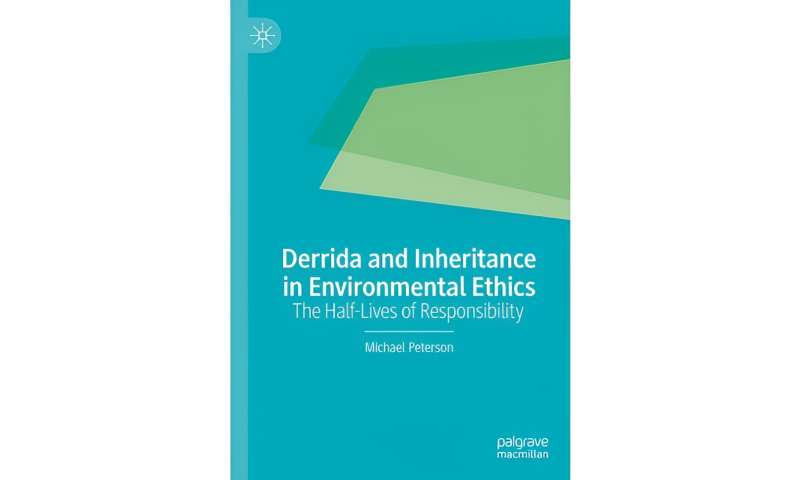New book examines how we currently store nuclear waste

A new book from a Missouri S&T researcher examines environmental ethics and the responsibilities the current generation has to future ones regarding the removing and storing nuclear waste.
Dr. Michael Peterson, assistant professor of philosophy at Missouri S&T, recently published "Derrida and Inheritance in Environmental Ethics." Derrida refers to French philosopher Jacques Derrida, and the book uses Derrida's perspective to consider the weight of waste responsibility.
The new book, published by Palgrave Macmillan, argues for the necessity of a re-evaluation of thinking about responsibly relating to future generations in the context of environmental philosophy.
"Intergenerational environmental policy poses a huge challenge to us because of the balance it requires us to strike between representing the interests of people who don't yet exist and not assuming that their interests will be identical to our own," says Peterson. "Similar to how our current generations have had to deal with the problems that crop up when inflexible institutions that existed before us continue to impact us even when they no longer represent our interests."
Peterson's book begins by surveying contemporary accounts of intergenerational responsibility before outlining the specifics of nuclear waste disposal policy. He then introduces Jacques Derrida's ideas into the discussion of future-oriented ethics. These include examinations of communication across contexts, the relationship between inheritance and responsibility, and the political constraints that result from these critiques.
"The challenge is to try to work out how to be responsible to future people without restricting their options," says Peterson. "Policymakers, when they think intergenerationally, need to be able to think 'responsibility' in a way that doesn't simply mean insisting on permanence."
The book concludes by arguing for an intergenerational environmental policy that rejects policy and infrastructural projects that depend on the present way of life continuing indefinitely.
So who is Jacques Derrida?
The man in the title of the book is a philosopher who is known for being an advocate for nuclear disarmament. His work provides a perspective that Peterson uses in his work to review current governmental policies.
"When I say that I am coming at an issue like ethics from a Derridean perspective, I mean that I am accountable to the challenges Derrida posed to really fundamental concepts in a shared intellectual and political history," says Peterson. "When we think of the survival of institutions, we can see that it would be a mistake to think that a responsible policy is one in which an institution would have to remain stable and unchanging because its capacity to change is linked to that institution continuing to be meaningful.
"It would be a mistake to orient our thinking of responsible inheritance around unchanging stability," says Peterson. "Coming at a problem from a 'Derridean perspective' means, more than anything, refusing to accept settled distinctions as starting points for our responsible thinking."
Aligning with S&T's nuclear engineering program
Peterson believes that it is a bonus to his research to be so near a program with nuclear energy technologies and the experts who study them through the nuclear engineering major at S&T.
"S&T's commitment to engineering training that engages responsibly with the world around us is one of the most exciting things about being here," says Peterson, who joined S&T in 2023. "This is especially true of programs that engage directly with the massive ecological and environmental challenges we are facing today, like the nuclear engineering program."
Peterson says he hopes to work closely with some of S&T's nuclear engineering experts to develop more solutions to the challenges of making policies and storing nuclear waste.
"Modern long-term policy does not adequately reflect the challenges posed by the use of nuclear energy," says Peterson. "Coming up with more adequate solutions to the problems at hand will require better understanding of what our scientists and engineers can predict."
Provided by Missouri University of Science and Technology